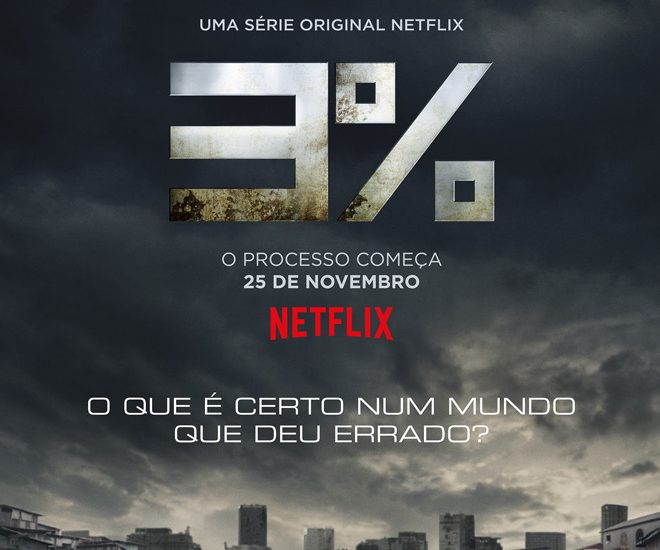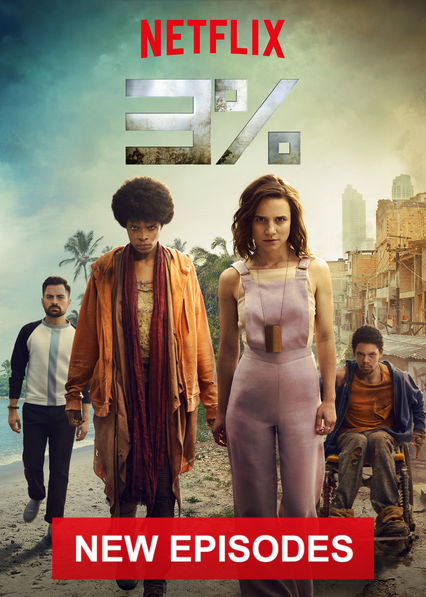By Mason Sansonia
3%, the Brazilian Netflix series is far more engaging than one might think from reading its premise in blurb form. Its science fiction setting follows themes that are rapidly becoming familiar. It features rebellious young men and women. Plus a vast disparity between the haves and the have nots. As well as various rules and regulations/tests and trials that stand between the young rebels and their happily ever after. The show really takes advantage of its 50-minute-long seasonal format. It creating an enjoyable episode to episode pace which always leaves the viewer hungry for more, but this is only part of the appeal. The real draw is not so much in the premise, but in the execution.
The show takes place in the distant future. Focused on a community split between two areas: the Inland and the Offshore. The Inland is a crumbling ruin of the past, with poor food and medicine. It is a wasteland of life that everyone wants to escape. The Offshore is that escape, a high-tech, eco friendly paradise. The only way to escape to the Offshore is through a process called… The Process (bland? Refreshingly simple? You decide!). The Process is a series of tests that, statistically, only about 3% of the candidates (all 20 year-olds from the Inland that particular year) pass.
Sound familiar? The show’s power mostly comes from the uncertainty it weaves into everything. The revelations and machinations of the characters perform a well-choreographed dance that leaves the viewer guessing as to what characters will ultimately decide. And, in many cases, are left to make their own decisions about what they think the correct paths are within the world the show builds. Nothing is force-fed to anyone watching, and as a result it can become an often unsettling question of who’s right, who’s wrong, and if the show takes place in a dystopic future or a utopic one.
On the surface it may seem like a no brainer. The inequality is massive and unjust, and thus the entire situation (including The Process) has to change, right? Not quite. The lure of a better life is a very real draw for the ensemble cast of prospective candidates attempting The Process. A promise of paradise in return for passing a difficult test is one familiar to many. And the show never shies away from the difficult and often confusing decisions the characters must make.
A huge part of that confusion comes from another element common to this kind of story. The older generation manipulating the younger. The administrators of The Process mostly appear friendly, if unmerciful. While their boss, the main antagonist Ezequiel, is both intense in his commitment to weeding out the unworthy and terrifically manipulative when necessary. This combination of ruthless determination and manipulation is encouraged among the Process participants who make up the main cast as well.
How can any group that encourages this type of behavior be something people would aspire to be a part of? Well, someone made the very clever decision to not reveal any substantial part of the Offshore throughout Season 1. So for all the audience knows, everything the characters are going is worth it. There’s no limit to what the Offshore could be. Unlike a more traditional dystopian future story. Where nothing is going to get better for the protagonists until the world itself changes. Here there is a very real chance for them to get everything they ever wanted with no rebellion necessary. Even those motivated by hatred, fear, or anger rather than a desire for a better life have their motivations and goals tested. And in many cases, those goals are changed forever.
The result is an atmosphere of distrust, fear, and desperation. As well as everyone in question wondering if what they want is a good thing. Or if they want it for the right reason, of if they’ve sacrificed the essential parts of themselves to get where they are. The physical conditions of the show mirror the plight of many who seek to emigrate from homes plagued by strife to other, more prosperous countries. The mindset will be familiar to anyone who has set out to pursue a dream only to find it costs far more than they ever thought they would have to give up.
Moreover, both seasons of 3% can be found on Netflix. A third season is confirmed for release in 2019. So give it a watch and decide if this particular brand of dystopia is up your alley.





